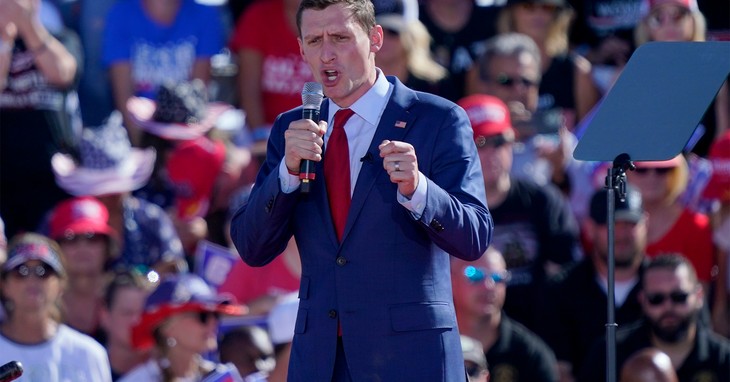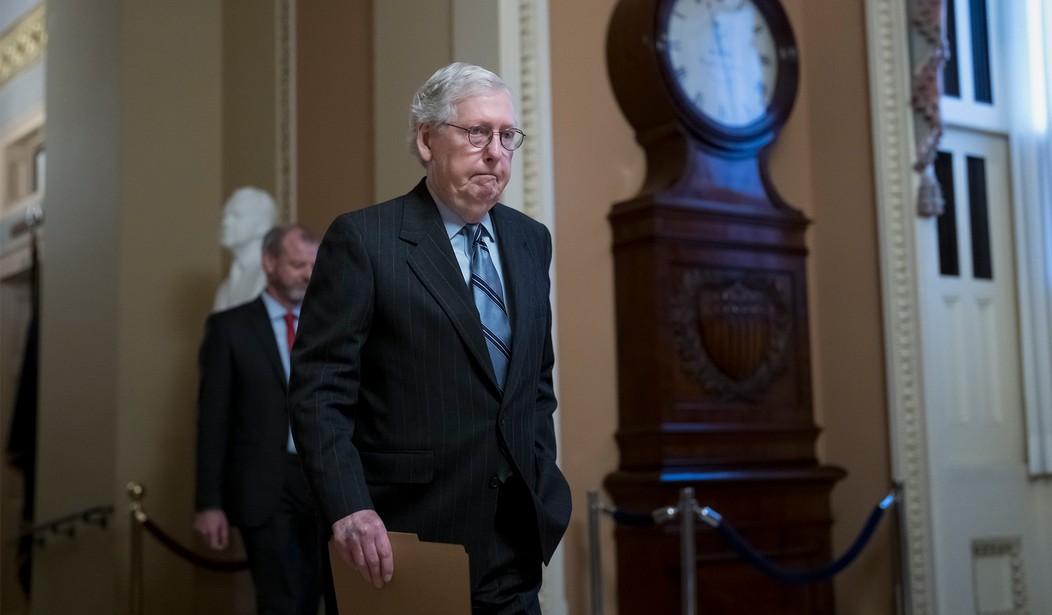Among conservatives who are extremely bitter about the red wave that wasn’t (as far as the Senate goes), one of the recurring complaints is that Mitch McConnell pulled his money (or, rather, his Senate Leadership Fund PAC pulled their money at his direction) out of places Republicans thought they were competitive and moved it to places that he felt were more important.
Blake Masters is one of the Senate GOP candidates hurt by that decision, as McConnell pulled his money from Arizona and moved it to Alaska (among other places) to support Lisa Murkowski, with a lot of the ad time they bought going to attacking the Trump-backed candidate in the race, Kelly Tshibaka. Masters went on Tucker Carlson’s show on Fox News to blast McConnell for the spending decision.
“You know what else is incompetent, Tucker? The establishment. The people who control the purse strings,” he said. “Had he chosen to spend money in Arizona, this race would be over. We’d be celebrating a Senate majority right now.”

One of the problems that many of the Donald-Trump-backed candidates saw in November, however, is that they ran far behind other Republicans in their states and districts when it came to competitive races. Masters ran several points behind other Republicans in Arizona, including gubernatorial candidate Kari Lake. Lake is currently being criticized by some on the right for telling McCain voters that she didn’t need their vote — which appears to have encouraged them to vote for Katie Hobbs or stay home.
The Washington Post has a pretty good breakdown of that data.
If we focus exclusively on districts where the margin of victory was less than 15 points, such that the seat was conceivably in the balance, the picture that emerges is quite different.
In these 114 districts, candidates bearing Trump endorsements underperformed their baseline by a whopping five points, while Republicans who were without Trump’s blessing overperformed their baseline by 2.2 points — a remarkable difference of more than seven points.
But this isn’t just about who got more votes. The problem actually seems to be deeper than some Republicans not wanting to vote for Trump-backed candidates, as the data suggests. Even the people who voted for those candidates were hesitant to open their wallets to them, according to the Associated Press.
In key Senate and House battlegrounds, Democratic candidates outraised their Republican counterparts by a factor of nearly 2-to-1, according to an Associated Press analysis of campaign finance data.
Consider the handful of races that helped Democrats retain their Senate majority.
In Arizona, Masters was outraised nearly 8-to-1 by Kelly, who poured at least $32 million into TV advertising from August until Election Day, records show. Masters spent a little over $3 million on advertising during the same period after Senate Leadership Fund pulled out of the race
Meanwhile, in Nevada, Sen. Catherine Cortez Masto raised $52.8 million compared to Republican Adam Laxalt’s $15.5 million. And in Pennsylvania, Democratic Sen.-elect John Fetterman took in $16 million more than his GOP opponent, Dr. Mehmet Oz. That’s despite the celebrity TV doctor lending $22 million to his campaign, records show.
Similar disparities emerged in crucial House races, including in Nevada, Pennsylvania and Virginia, helping to limit House Republicans to a surprisingly narrow majority.
This isn’t an indictment of all the candidates, mind you. Other than the McCain voter comment, Lake was good on the campaign trail. Masters likewise got a lot better as time went on, being extremely competitive on the debate stage with Mark Kelly. Adam Laxalt was undoubtedly a better choice for the Senate. And so on.
But the fact remains that the GOP has a money problem as much as it has a candidate problem. The AP points out that candidates don’t have to pay nearly as much for ad time in some places as PACs do, meaning that had the candidates been better at raising money for themselves, they could have gotten more exposure.
When it came to purchasing TV ad time, Democrats’ fundraising advantage yielded considerable upside. Ad sellers are required, by law, to offer candidates the cheapest rate. That same advantage doesn’t apply to super PACs, which Republican candidates relied on to close their fundraising gap — often at a premium.
In Las Vegas, for example, a candidate could buy a unit of TV advertising for $598, according to advertising figures provided to the AP. That same segment cost a super PAC $4,500. In North Carolina’s Raleigh-Durham media market, a $342 spot cost a super PAC $1,270. And a $580 candidate segment in the Philadelphia area cost a super PAC nearly $2,000, the advertising figures show.
The problem for Republican candidates right now isn’t just quality. The money issue is a big concern. Remember: the Senate GOP group that is specifically in charge of spending in a lot of these races was having money problems stemming from less-than-ethical means of fundraising, promptly leading to much of the same in-fighting we’re seeing right now.
So that’s now three major problems for the GOP moving forward.
The first is candidate quality. Other than the ones mentioned above, the Republican Party saw itself burdened with either bad candidates or unpopular ones, and it certainly looks like ties to Trump hurt those candidates. That is something the GOP has to deal with even more with Trump having announced his candidacy for 2024.
The second is fundraising. Candidates are finding themselves without money and they can’t get exposure in the competitive environment that we currently have. The result is that well-funded Democratic candidates are soaking up all the ad time and Republicans can’t break through.
The third problem is the rise of the PAC and party-affiliated groups, which are raking in all the money that candidates so desperately need. The result of that is broke candidates losing out on airtime while consultants get paid an insane amount of money for increasingly poor results.
The Republican Party, therefore, definitely needs to drop the establishment and find better candidates, but perhaps just as pressing as that is shunning the grifting consultant class that has bled their voters dry.













Join the conversation as a VIP Member